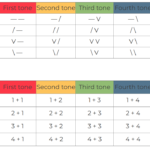Articles in the ‘Listening’ category Page 4
-
How to learn Chinese pronunciation as a beginner
Pronunciation is an important, yet often neglected part of learning Chinese. The earlier you get the sounds and tones down, the better, but how should you approach learning these things as a beginner?
Read → -
Time quality: Studying the right thing at the right time
Many students think that learning a language is limited to going to class, working your way through difficult texts or having conversations with native speakers. These all contribute to your learning, but learning is not limited to things you can schedule in your calendar. If you think of it like that, you’ll miss so many learning opportunities!
Read → -
How to start learning Chinese again after a break
Are you picking up Chinese again after a break, and struggle to find the words and characters? Does spoken Mandarin sound vaguely familiar but incomprehensible? Then this guide will help you get back on track!
Read → -
A guide to Pinyin traps and pitfalls: Learning Mandarin pronunciation
When learning to pronounce Mandarin, you need to learn both the sounds and how they are written, usually with Pinyin. Did you know that many student errors actually come from a poor understanding of Pinyin, rather than the sounds themselves being difficult? Welcome to my guide to Pinyin traps and pitfalls.
Read → -
How to improve fluency in Chinese by playing word games
What if I told you that there is a game that helps you speak Chinese more fluently, is great for improving communicative ability and works well regardless of your current level? What if I said that the game is also fun and free to play?
Read → -
The building blocks of Chinese, part 5: Making sense of Chinese words
How many characters do you need to know to be able to read Chinese? The truth is that characters only provide a foundation, so regardless of how many you know, you won’t be able to read much unless you also know many words.
Read → -
Using voice messaging as a stepping stone to Chinese conversations
Being able to have a conversation is a goal for most students of Chinese, be it with loved ones, for professional purposes or for travel, but what if you think conversations are too scary, too difficult or just impractical? Try using voice messaging as a stepping stone to better conversations in Chinese!
Read → -
A smart method to discover problems with Mandarin sounds and tones
It’s often hard to assess one’s own pronunciation when learning Mandarin. People around you might understand what you are saying, but that doesn’t necessarily mean your tones are good. Simply asking people if your pronunciation is good won’t work either, because they will often tell you that your pronunciation is good even if it’s not. So how can you find out how good your pronunciation really is?
Read → -
Chinese language logging, part 3: Tools and resources for keeping track of your learning
Logging you language learning can be very useful, and there are many tools and resources out there to help you, but which are the best and how do you use them?Logging you language learning can be very useful, and there are many tools and resources out there to help you, but which are the best and how do you use them?
Read → -
Learning to understand regionally accented Mandarin
As soon as you leave the classroom, you will notice that people don’t speak Chinese the way your teacher and textbook do. Why is that, and what can you do to learn to understand regionally accented Mandarin?
Read →









